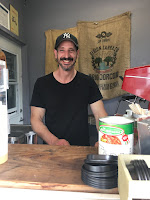Ted. Our
tour of Nova Scotia led us to two Canadian National Historic Sites; Port Royal and Grand Pré ("Big Meadow" in English). The Annapolis River Valley was once on the front lines in a
centuries-long fight between the British and the French.
 |
| Exterior of recreated compound at Port Royal |
Port Royal was founded as a French trading
settlement in 1605, five years before Jamestown. The compound was burned to the ground by
the Brits in 1613 because their turf (Virginia!) was being infringed upon.
 |
| Interior |
But
that was just the start, as this area repeatedly changed hands between these two superpowers over the decades.
Becoming British once again in 1713, a series of small wars led the Brits to
conclude that all French speaking Catholics needed to be removed so that English
speaking Protestants could take their place. As it turns out, ethnic cleansing wasn’t a 20th century invention!
From 1755-1764, 80% of all
Acadians (more than 10,000 men, women and children) were stripped of their
property and forcibly deported from Grand Pré and the other French communities in what became known as The Great Expulsion.
 |
| Grand Pré Unesco World Heritage Site |
Actually, none of them went straight to Louisiana (as I erroneously stated in my previous
post). They were mostly shipped to the English colonies in North America. Tossed onto distant shores with virtually nothing but the clothes on their backs, speaking a different language and practicing a different religion, the Acadians somehow survived. Over the following decades, the descendants of this diaspora scattered across the continent with some even returning to Europe. And yes, a number did end up in Louisiana. Henry Wadsworth Longfellow was deeply moved upon hearing the tragic story of a young Acadian refugee who had travelled across North America searching for her lost love, Gabriel. In 1847 he immortalized her story in an epic poem, Evangeline, A Tale of Acadie.
 |
| Statue commemorating Evangeline with memorial chapel |
When we see the unprecedented
numbers of refugees wandering the earth now, it would appear that humanity has
never learned a thing. It is also apparent, though, that we are an irrepressible
species and, given half a chance, tend to flourish wherever we are planted. One wishes the best for today's Evangelines.














